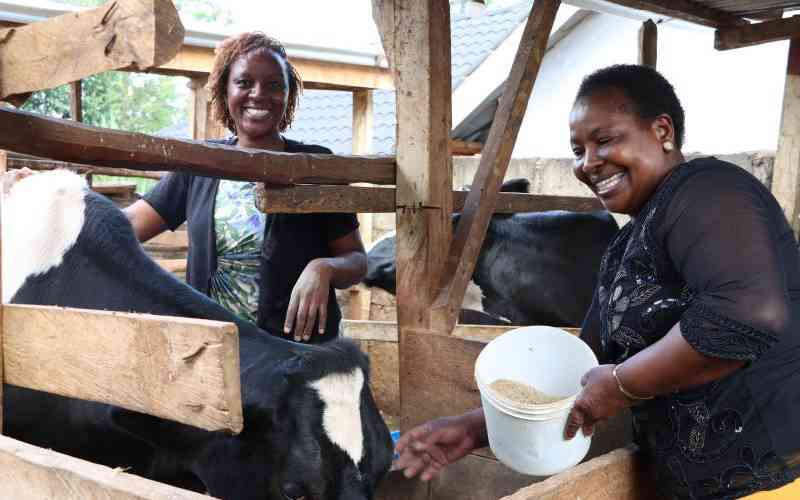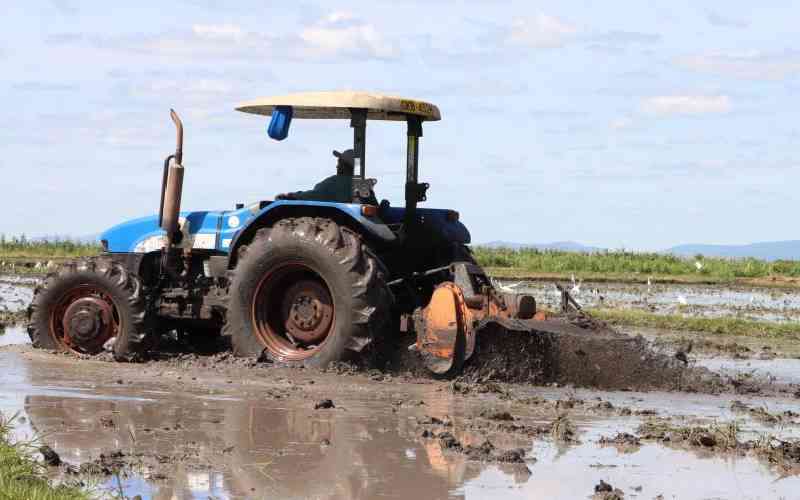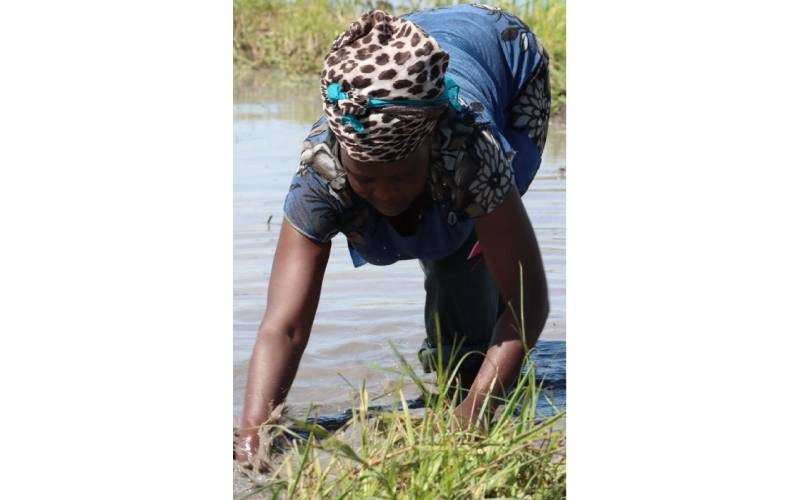
Following the collapse of Kenya Cooperative Creameries (KCC) in 1990s, a group of 35 small-scale milk producers in Kirinyaga (some with just one milking cow) formed a self-help group.
They called themselves Kirima Slopes Self-Help Group. "The idea was to look for a market for our milk," says Samuel Wachira, the group's treasurer today.
To grow their operations, the group needed quick capital injection to purchase equipment for professional handling of milk and transportation.
They visited a few creditors - including some banks - but were turned down. "We were un-bankable: no one was willing to 'risk' their money with us," Wachira says.
This has been the story of small-scale farmers: men and women who farm on pieces of land below 3 acres, and mostly on a subsistence basis.
Despite accounting for over 70 per cent of agricultural production and about 75 per cent of food demand in Kenya, small scale farmers are finding it hard to access credit to go about farming.
"They are viewed as a big risk by creditors because they largely operate outside the formal financial systems, which impairs creditors' trust.
"They don't produce in large quantities - amounts that would make business sense to creditors - unlike large scale producers.
"At the same time, majority of small scale farmers in Kenya practice rain-fed agriculture. In the age of climate change, production is not assured, and this scares creditors.
"Even so, assuming that the farmer goes on to realize a bumper harvest, they do not have control over market prices.
"With perishable goods, they might opt to sell at a loss and would not be able to service a loan," explains Esther Kariuki, a banker with Cooperative Bank of Kenya (Co-op Bank).

It is a conundrum that faults neither farmers nor creditors; a problem that makes sense both ways.
The farmers don't even bother asking for credit. "Unless there is some form of security, like a title deed, it is impossible to get a loan as a farmer," says Edward Njaibu, a Nyeri-based vegetable farmer.
In 2014, Kirima Slopes Self-Help Group converted into a co-operative society. "We then approached Co-op Bank since we had heard of their relationship with farmer cooperatives. The bank signed us up and we registered an account with them," says Wachira.
Members of Kirima Slopes Dairy Cooperative Society, for the first time, were able to access credit for undertaking farming activities.
Simon Mukono and his wife Alice Gituka are members of Kirima. They say being part of the cooperative has given them a sustainable way of growing their dairy venture.
"The biggest operation costs go to animal feed. Kirima supplies us with 30 bags of dairy meal - a high protein feed critical to quality milk production - every month.
"If we were to buy out of pocket we would need at least Sh90, 000 which we don't have in one go. So, they give us the feed, we supplement with silage.
"The society collects milk from us (about 100 litres) every day. They pay us Sh50 per litre. At the end of the month, they deduct their Sh90,000 and send us the rest in one batch. It really works for us small scale farmers," says mukono.
Mukono, at different times, will also order for other farm inputs such as mineral salts and artificial insemination (AI) services.
Just last month, on May 24, Miss Kariuki was declared African Banker of the Year 2023, at the 58th Annual Meeting of the African Development Bank (AfDB), "for making small-holder farmers bankable; and improving their livelihoods," read the accolades.
Just how did she - and her team - do it?
"By addressing the challenges the farmers face, and creating an interface that allows the bank and the farmers to trust each other," she says.
To start with, the credit comes in form of actual tools and inputs that the farmer utilizes directly at the farm.
"The reality of small-scale farmers is that they are not just farming: they have domestic issues to attend to - like children's school fees.
"If we gave them actual money, they might end up spending it on something other than farming, beating the logic of extending them credit.
"We therefore pay for the purchase of all the input the farmer will need: that way we have some level of certainty that the farmer will actually produce food, which they can sell, and pay back the bank," says Kariuki, who is also the head of Agriculture Business at Co-op Bank.
At the award ceremony, held in Sharm-El-Sheikh, Egypt, she was credited for creating an end-to-end credit administration process that has ensured a near 100 per cent loan repayment rate - a fit not expected with small scale farmers deemed as 'risky' borrowers.
The first step is unifying farmers to operate in cooperatives. This gives them the critical mass for business and the bargaining power to buy (inputs) and sell (produce).
Kariuki says: "The end-to-end credit structure was achieved by way of partnerships and collaborations.
"Take a rice farmer for instance: we figured she would need quality seeds, land preparation, irrigation services, fertilizers, pest and disease agrochemicals, harvesting tools, packaging, transportation and a market to sell the produce.
"We have formed relationships with input and equipment providers such as Bayer East Africa (pesticides), Yara (fertilisers), Toyota CFAO (farm equipment) and others.
"We bring the cooperative and the input manufactures together. They negotiate a good price for purchase of inputs. The invoice is passed to the bank and we pay on behalf of the farmers."
The farmers then collect purchased input as requisitioned. Upon harvesting, the farmers' produce is collected by the society and aggregated for sale.
"There is no society, credited by Co-op Bank, that has ever failed to get a ready market for produce. We have taken it upon ourselves to link them to a ready market, where they would sell at a price that would ensure the farmer realizes profits," Kariuki says.
Miss Kariuki was praised for working hard to give farmers greater access to markets and better prices in potatoes, rice, cotton and coffee subsectors.
"It is important that once the farmer has produced, they are able to sell, and make a profit - just like with any economic venture."
Kariuki and her team crafted the direct export of coffee by Kipkelion Coffee Co-operative Union, to coffee roasters in South Korea, the first ever direct sale of coffee between an international buyer and small-scale farmers without involvement of a broker.
"The transaction enabled farmers to earn a premium rate of Sh130 per kilogram of coffee cherry: the highest ever paid to coffee farmers in Kenya," she says.
Milk farmers have Meru Dairy as the ready buyers. For rice, it is Kenya National Trading Corporation (KNTC) - who supply government affiliated agencies.

Rice is also taken up by King's Commodities Company - who package and sell various brands.
The bank has engaged Simplifine (an approved off-taker for KFC - the international restaurant chain) who take up potatoes from the farmers.
Thika Cloth Mills and Rivatex East Africa are always on the ready to absorb produce from cotton farmers.
The end-to-end credit structure makes Co-op bank the nerve center of connectivity between small-scale farmers, input manufacturers, equipment makers, service providers, and buyers.
All buyers pay societies through accounts held with the bank - at which point the credit facility is serviced via a check-off system.
The only potential challenges to the repayment of the loans would be: one, moral hazard where a farmer misuses inputs or fails to deliver produce to the society. Two, crop failure that might result from unpredictable weather.
"We mitigate against these by training and capacity building the society; to hold its farmers accountable and walking with them throughout the crop cycle," says Kariuki.
"When a farmer fails to deliver yet they have been supplied with inputs we summon them. In some cases, we de-register them off the society. However, this happens rarely.
"We also hold training for them to learn about benefits of integrity and financial management, so that they make prudent decisions with the inputs they pick from the society," says Wachira.
When there is a total crop failure, the bank has a secret card up the sleeve: insurance.
"We insure the farmers through CIC Insurance; who pay the bank in the unlikely event there is total crop failure," Kariuki says.
In the 2021/2022 financial year, the bank disbursed over Sh10 billion to small scale farmers for primary food production.
The farmers, if the level at which they are servicing the loans is anything to go by, are loving this new way of financing projects.
 The Standard Group Plc is a multi-media organization with investments in media
platforms spanning newspaper print
operations, television, radio broadcasting, digital and online services. The
Standard Group is recognized as a
leading multi-media house in Kenya with a key influence in matters of national and
international interest.
The Standard Group Plc is a multi-media organization with investments in media
platforms spanning newspaper print
operations, television, radio broadcasting, digital and online services. The
Standard Group is recognized as a
leading multi-media house in Kenya with a key influence in matters of national and
international interest.



